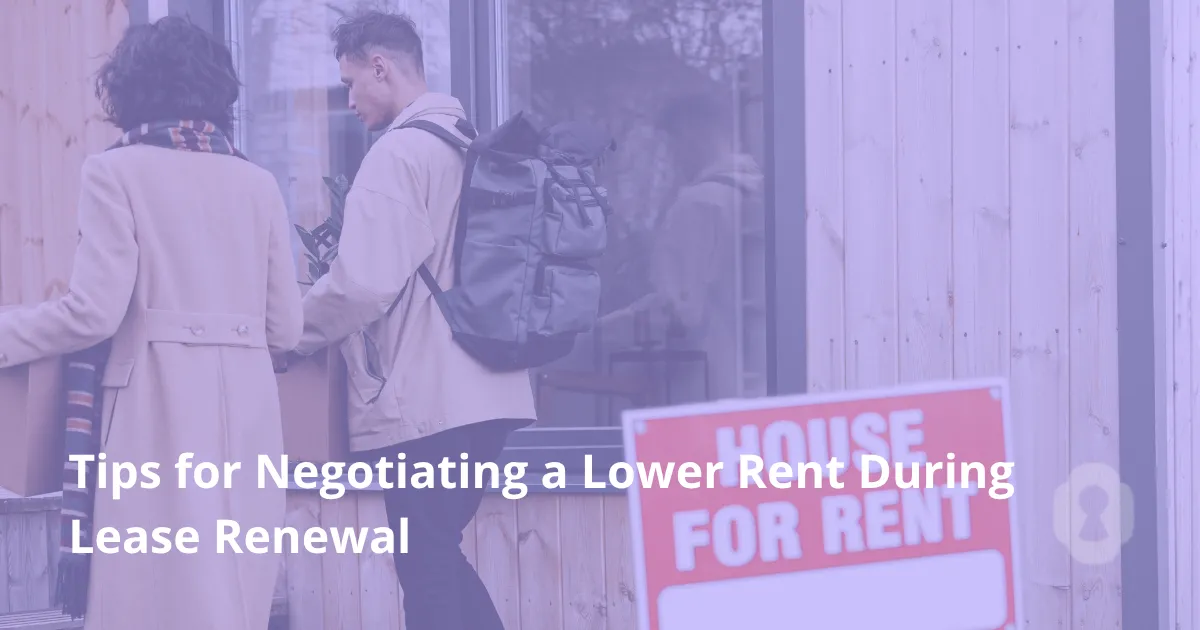
Did you know nearly 75% of renters who negotiate their rent successfully save at least $100 a month?

Negotiating a lower rent during lease renewal can be easy if you're prepared.
Knowing the current rental market and your landlord's view can boost your negotiation skills. It's not just about being bold; it's about being respectful and informed.
A good negotiation can make your living costs lower. This lets you use your money more wisely.
"What's often overlooked in lease renewal conversations is the quantifiable cost of tenant turnover for property owners. When a reliable tenant vacates, landlords face an average of 4-6 weeks of lost income plus marketing costs, screening expenses, and make-ready repairs that typically total 2-3 months of rental income. This creates a mutual economic incentive that savvy renters can leverage. The most successful negotiations aren't confrontational but collaborative—presenting data-backed proposals that acknowledge this shared interest in continuity. Tenants who frame their request as a business case rather than a personal favor consistently achieve better outcomes in today's fluctuating rental market."
Taylor Wilson, CEO of Rent with Clara
Before lease renewal time arrives, take a few weeks to research what's actually happening in your local rental market. This homework makes all the difference between walking into negotiations blind versus knowing exactly what leverage you have.
Check listings on Zillow or Apartments.com for comparable units, drive around your neighborhood to spot "For Rent" signs, and maybe even call a local property management company to ask about current rates. When vacancy rates are high in your area, landlords face real pressure to keep good tenants rather than risk months of lost income hunting for new ones.
Start by pulling up recent listings for apartments similar to yours - same square footage, bedrooms, and amenities. You'll want to know your rights about what constitutes a fair market rental rate, especially if you're in a rent-stabilized building.
Real estate websites give you a snapshot, but talking to neighbors or local agents reveals what people actually pay versus what landlords ask. This research becomes your ammunition when you reach out to your landlord to discuss renewal terms.
According to experts, understanding the local market can give you a significant advantage in negotiations.
Some effective ways to research include:
Understanding whether it's a tenant's or landlord's market changes everything about how you approach the conversation. High vacancy rates mean your landlord may be willing to negotiate rather than gamble on finding someone new. Tenant turnover costs them money in advertising, cleaning, and lost rent.
Check local news for apartment construction trends and economic shifts that affect rental demand. If the local rental scene shows plenty of empty units, you've got more room to push for a smaller rent increase or even a reduction.
As noted by a
"In a tenant's market, where vacancy rates are high, landlords may be more willing to negotiate to keep good tenants."

Timing matters more than most people realize when it comes to rental negotiations. College towns see prices spike before fall semester, while family-oriented neighborhoods peak during summer when people avoid mid-school-year moves.
If your lease expiration falls during a slow season, say, winter months when fewer people move, you're in a stronger position. Don't wait until the last minute to start this analysis; knowing seasonal patterns helps you frame your request in terms your landlord or property manager can't easily dismiss.
Walking into a lease renewal conversation without documentation is like showing up to court without evidence. You need a solid case that shows your landlord why keeping you at a lower rate makes more business sense than risking vacancy.
Pull together your payment records, maintenance requests, and comparable listings. This isn't about begging for a favor, it's about presenting facts that justify your request.
Nothing speaks louder in negotiations than proof you've paid your rent on time every single month. Print out bank statements, payment confirmations, or screenshots from your landlord's payment portal showing you've never missed a deadline.
If you've been in your current lease for years without a single late fee, that track record is gold, replacing you means gambling on someone without that proven rental history. Your landlord saves money by keeping a reliable tenant, and these records prove you're exactly that kind of tenant.
To document your payment history well:
Beyond just paying rent on time, think about what else makes you valuable during your tenancy.
Have you reported maintenance issues promptly before they became expensive problems?
Did you cooperate during property showings or help maintain common areas?
Maybe you've been flexible when repairs needed access to your unit. These behaviors reduce stress and costs for landlords, which matters when they're weighing a rent increase against the hassle of starting fresh with someone new.
Make it clear that your renewal with your landlord represents stability they won't easily find elsewhere.
Showing these qualities can convince your landlord to keep you as a tenant at a lower rent.
This is where your market research pays off. Compile a list of similar units currently available at lower monthly rent than what your landlord wants to charge. Screenshot listings with addresses, square footage, and asking prices so your comparison holds up under scrutiny.
Focus on properties within a few blocks and built around the same time as yours. If you can show three comparable apartments renting for $150 less than your proposed renewal rate, you've got concrete evidence that current market rental rates don't support what you're being asked to pay.
Success in negotiating a lease renewal comes down to strategy, not luck. You need the right timing, the right tone, and realistic expectations about what you can achieve.
The landlords most likely to negotiate are those who understand that good tenants represent value worth preserving.
Start the conversation 60-90 days before your lease expiration. Early enough that neither party feels rushed but not so early that market conditions might shift. Review your lease agreement carefully to understand any clause about renewal terms or automatic increases.
When you negotiate with your landlord, frame it as planning ahead together rather than making last-minute demands. This timing gives you room to explore flexible lease terms or alternative solutions if your first proposal doesn't work.
This gives both sides time to think without feeling rushed.
Key considerations for timing:

Communication is key when you're trying to negotiate a lease renewal. Keep emails polite, phone calls brief and focused, and any in-person meetings respectful. Avoid emotional language or complaints; instead, present your case as a business proposal backed by market data.
Express your desire to stay while explaining why the current renewal offer doesn't work for you financially. Even if your relationship has been casual, treat this negotiation formally enough to show you're serious about finding terms that align with both your needs and the landlord's business goals.
The best negotiations aren't one-sided wins. They're trades where both parties gain something. If you need a lower rate, consider offering something valuable in return like signing a longer lease term in exchange for stability your landlord wants.
Maybe you'd accept responsibility for minor maintenance or agree to certain terms and conditions about modifications. Being willing to compromise shows you understand negotiation as a two-way street, which makes landlords more receptive than if you simply demand concessions.
Potential concessions:
Many landlords will accept less monthly rent in exchange for a longer commitment, say, signing a two-year lease duration instead of one year. This trade-off reduces their risk of vacancy and advertising costs while giving you predictable housing costs longer.
When you propose this, calculate exactly what the savings would be over time and present it clearly: "I'd like to suggest a 24-month lease at the current rate rather than a 12-month renewal with a 5% increase." You might even find a template online to formalize this proposal professionally.
Benefits of longer lease terms:
By using these strategies, you can negotiate a better lease renewal and possibly lower your rent. Stay professional, be ready to compromise, and think about the benefits of longer lease terms.
Sometimes landlords genuinely can't lower the rent. Their costs have increased, or building expenses leave little room to negotiate.
When that happens, shift your strategy to finding other options within your budget that make the renewal worthwhile. Getting creative about what you ask for often yields results when direct rent cuts don't.
If your landlord won't budge on price, ask for improvements to the property that increase your quality of life without significantly impacting their bottom line. This could mean repainting, upgrading old appliances, or tackling that renovation project you've mentioned before like updating bathroom fixtures.
Some landlords find this easier to agree to than cutting rent because improvements to the property add value they can leverage with future tenants. Frame it strategically: "I'll renew at the proposed rate if we can address the kitchen cabinets that need replacing."
Look at what other costs you can reduce even if the base rent stays firm.
Can they waive the renewal administrative fee?
Reduce parking charges?
Return part of your security deposit since you've proven reliability?
If you're negotiating lease terms for a new apartment in the same building, sometimes landlords will absorb moving costs or waive deposits entirely. These savings might not feel as significant as a smaller rent increase, but they add up especially if you're worried about whether you can afford to rent an apartment at all.
You could say, "Can we talk about waiving the administrative fee or lowering the security deposit?" This is a good idea if you're signing a longer lease agreement.
Consider whether flexible lease terms like going month-to-month might actually serve you better than locking in a new agreement. Month-to-month arrangements give you freedom to leave without penalty, though landlords typically charge premium rates for that flexibility.
Compare this against signing a standard lease extension in exchange for better rates. Sometimes the stability is worth it, sometimes the flexibility matters more depending on your situation. If you're in New York City's competitive market, for instance, your lease renewal rights might give you more leverage than you realize.
Getting "no" doesn't mean the conversation's over—it means you need to adjust your approach. If your landlord won't lower the rent, come back with alternatives: "I understand you can't reduce the rate, but would you consider including free rent for the first month if I sign now?"
Ask what would make a lower increase possible, maybe they'd reconsider if you handle certain maintenance yourself or agree to specific terms and conditions. The goal is finding middle ground where both sides feel the agreement makes sense.
Remember, learn how to negotiate by practicing even if this attempt doesn't work perfectly, you're building skills for next time when you negotiate your rent or raise the rent discussion comes up again.
Successfully negotiating lease terms comes down to preparation, timing, and knowing what you bring to the table as a tenant. The rental market rewards tenants who do their homework, present clear cases based on market rates, and approach landlords as business partners rather than adversaries.
Whether you secure a rate freeze, a smaller rent increase, or valuable upgrades, any improvement over the initial renewal offer represents a win.
Don't let fear of rejection stop you from trying - landlords expect some pushback at renewal time, and many respect tenants who advocate professionally for themselves. Even if your landlord or property manager doesn't grant everything you request, starting the conversation early and backing up your ask with solid market data positions you as someone who knows your rights and understands the business.
The worst outcome is staying silent and accepting terms that don't align with what you can afford or what the market supports.